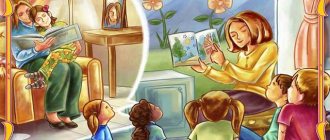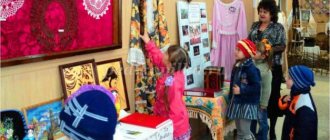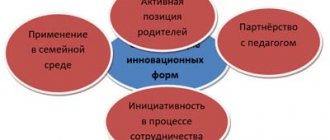Effective forms of interaction with parents (from work experience)
- February 23, 2013
Competition “My Pedagogical Initiative – 2012”
Nomination “Working with Parents”
One of the conditions for the successful creative development of a child is the joint activity of parents, children and teachers. Family and kindergarten, having their own functions, cannot replace each other. Creating a unified space for child development is impossible if teachers and parents remain in the dark about each other’s plans and intentions.
Kindergarten is the first public institution with which parents come into contact and where their systematic education begins. The level of pedagogical culture of parents, and, consequently, the level of family education of children, largely depends on the quality of this work.
Therefore, I believe that positive results in raising a child can be achieved as a result of coordinated actions of the teacher, assistant teacher and family, the development of parental interest in education issues, and the establishment of trusting business contact between the family and the kindergarten.
When I started working on the Rainbow program, I began to worry about questions: what forms of interaction with parents are most effective and what are the ways to implement them? In addition to parent meetings, group and individual consultations, I began to use new forms, the main purpose of which was the pedagogical education of parents and their involvement in the educational process.
Thus, family participation in the educational process will improve the quality of children’s education, since parents know their child’s capabilities better and are interested in their further advancement.
The list of new forms I use includes:
- Round table meeting.
- Evenings of questions and answers.
- Disputes.
- Information leaflets, etc.
In my work on interaction with parents, I apply the following principles :
- Focus.
- Systematicity.
- Taking into account the specifics of each family.
- Taking into account the experience of parents.
- Goodwill.
- Openness.
In order to know the family better at the beginning of the year, I draw up a “social passport” of the group :
- age of parents.
- family composition (full, incomplete),
- number of children in the family,
- educational level of parents,
- socio-economic situation in the family.
I talk with parents and children about the summer holidays, about what’s new with the child.
Of course, trusting relationships with parents did not immediately develop. Some parents lacked motivation for communication and had no desire to bring family problems up for discussion. I tried to avoid criticism and build communication based on dialogue and partnerships. Gradually, my parents began to understand that I was sincerely interested in solving common problems for the kindergarten and the family, and, believing in this, they began to listen carefully to advice and be more critical of themselves and their child.
At the beginning of the year, a survey was conducted on the topic “Identification of the state and development of cooperation between family and kindergarten.” These questionnaires helped me in my further work, namely, I drew up a long-term action plan with my parents, taking into account the wishes and their advice.
In individual work I use moving folders. For example, the Convention on the Rights of the Child. Why this particular topic, because it’s no secret that parents do not know the rights of their child and how unpleasant it is to talk about it when child abuse occurs. “Preparing your hand for writing” - where recommendations and various strokes were posted.
In the parent corner, the “Hero of the Day” section is of particular interest to parents. For example, I put the following information in it:
“Tolik listened carefully to Nastya’s story today. – Gena was polite. – Nastya ideally fulfilled the duties of a duty officer in a corner of nature.
The use of various forms of interaction with parents has yielded certain results. Parents became active participants in all matters. They began to treat their child as an equal, and realized that it was unacceptable to compare him with other children. They began to show interest in the child’s affairs and be ready for emotional support.
Bibliography:
- T.N. Doronova, V.V. Gerbova, T.I. Grizik, E.V. Solovyova “Rainbow”. Program and methodological guidelines for the upbringing and education of children aged 6–7 years in kindergartens. M. Education, 1997;
- T.N. Doronova “On the threshold of school”: methodological recommendations for educators working with children 6–7 years old under the “Rainbow” program. 3rd ed. M. Education, 2004
I would like to present a description of my work for the academic year 2010-2011 in the form of a modern, familiar genre - the fascinating private detective “The Disappearance of Kuzi the Hedgehog.”
The form is, of course, fabulous, but based on real events.
Appendix 1: Working with parents.
Appendix 2: Private detective “The Disappearance of Hedgehog Kuzi.”
Author: Sinaeva Valentina Vladimirovna, teacher, highest qualification category, Preobrazhensky kindergarten “Malyshok”, Preobrazhensky village, Nazarovsky district of the Krasnoyarsk Territory. 27 years of experience. Diploma of the laureate of the regional competition “Trade Union Prize named after Hero of Socialist Labor K.A. Mixon." Certificate of honor from the Ministry of Education and Science of the Russian Federation. Finalist of the All-Russian competition “My best lesson 2012-2013”.
Working with parents in additional education. My work experience
Growing personality together: experience of working with parents
in the studio "Sudarushka" MAUDO "DDT"
Parents and their children, when they come to an additional education institution, are involved in activities based on voluntary choice in accordance with their interests, inclinations, and values. In this context, the family, in relation to the institution of additional education, no longer acts only as a consumer and social customer, but also as a partner. Modern parents consider the institution of additional education not only as a place for developing a child’s hobbies and organizing his leisure time, but also, above all, are interested in the child’s educational success and are aimed at educational results. Therefore, for a teacher of additional education, it is very important to establish partnerships with parents, create an atmosphere of support and community of interests, mutual understanding, cooperation and interaction.
The effectiveness of interaction with parents largely depends on the forms of work organization. Agree that by combining the efforts of additional education teachers and parents, the child is provided with double protection, emotional and psychological comfort, an interesting and meaningful life in a creative association and at home.
A wide range of opportunities for realizing personal potential and achieving high creative results are provided in the artistic studio “Sudarushka”, where girls, in addition to various types of arts and crafts, learn the rules of etiquette.
Favorable conditions are created here for the harmonization of the child’s physical and spiritual development, where he comes mainly of his own free will. When organizing work with parents, I first of all determine the content and methods of cooperation and reflect this in terms of educational work. I study the educational needs and expectations of parents from classes. The joint activity of the teacher and parents in the interests of developing the child’s personality will be productive only if the teacher and parents can determine the unity of goals and objectives in the upbringing and development of the child, if they become allies. Not all parents are interested. But I try to find forms of interaction that will help motivate parents and properly organize cooperation.
1
From my work experience, I can say that in order to establish partnership, open, trusting relationships with parents, the following conditions must be met: 1. Respecting the family system means accepting it as it is, without the desire to remake it, not imposing your opinion and feeling the boundaries of the family . It is important to realize that an educational organization does not offer itself as an alternative to life in the parental home, but complements and enriches it. The teacher’s respect for the family as a system allows the child to feel calm and confident between these two authorities without tension and not only supports the authority of the parents, but also strengthens the authority of the teacher.
2. Compliance with parents, the position “We: “We help children together.” Unfortunately, quite often the teacher takes a position of pressure “from above” in relation to the parent, ordering, imposing his point of view. Each of the interaction partners has the right to their own opinion, which must be respected.
3. It is very important to ensure emotional safety. It is important for parents to realize that the educational environment for their children is comfortable and not capable of causing harm. We are constantly working to maintain a friendly psychological climate in the classroom.
The forms of interaction with family are very diverse. In the practice of my work, I have identified for myself the following forms of interaction with parents.
Group forms:
· Open classes
· Parent meeting
· Exhibitions for mothers and grandmothers
· Joint holidays “Dedication to Sudarushki”, “Christmas gatherings”, “Mom’s Smile”, “Cheerful Artist” and others
2. Customized forms:
· Questioning, diagnostics
· Individual consultation (conversation)
· Educational work
I will dwell on the above in more detail.
Open classes
– classes with the invitation of students’ parents. This is a way to satisfy interest in how classes are conducted. Familiarity with the content, methods and techniques of training and education, conditions for conducting classes. An open lesson allows parents to demonstrate their children’s creative capabilities, successes and achievements. Parents are proud of their children when they see them
2
success, and children's self-esteem increases. I conduct open classes in December and April, that is, closer to the end of the school year, so that the growth of students can be seen. After such classes, an exchange of opinions and wishes is organized with parents at the parent meeting “Summing up the results of the school year.”
Parent meetings
. On them we solve questions on current problems of the educational and educational process. The lion's share of issues resolved at meetings is the acquisition of necessary materials and tools for various types of arts and crafts. At the meeting, detailed lists of necessary materials and tools are compiled for six months and distributed to parents. Retail outlets and stores where they cost less are discussed. Also at the meetings, assistance in the design of exhibition works for competitions of various levels, assistance in preparation for exhibitions, competitions, etc. is condemned. It is always nice when parents come up and offer their help.
Also, at parent meetings, the relationships between children in each of the two groups are often discussed, since girls of different ages study in them, from 6 to 13 years old. And here it is very important to ensure that the elders do not mock, but help the younger ones; the younger ones, looking at the more complex work of the older girls, did not envy and did not say why I don’t do such work, but understood that by gaining experience, skill, and applying diligence, they would also be able to make the same beautiful thing, perhaps even next year.
It is interesting to exchange opinions during thematic parent meetings that touch on important issues: “Help your child improve his health,” “A child learns what he sees in his home,” “How to help your child learn,” “Children’s lies and adult problems.”
Exhibitions for mothers and grandmothers
must be held on Mother's Day and March 8th. If children prepare themed products for the New Year, Christmas, Easter, then an exhibition of souvenirs for these beloved holidays is also held. Children make invitations for mothers and grandmothers and give them to them, and then, if they wish, they themselves show their work and the work of their friends in the studio. They really enjoy playing the role of a tour guide.
Questioning, diagnostics
are carried out to clarify the requests of parents, satisfaction with the work of the teacher, association, organization. The deputy director for educational work, methodologists of our “Children's Creativity House”, pedagogical and
3
methodological literature.
Individual consultations (conversations).
They provide an opportunity to get to know the microclimate in the family and discuss problems that concern parents and teachers. I think this form is very effective. In individual conversations, parents are more open than in group meetings. I conduct consultations on my own initiative, using a verbal invitation by phone, or I convey a written invitation through the child. Sometimes parents themselves take the initiative. In the invitation, it is important to formulate the purpose of the conversation with the parent, so that the parent does not worry, but thinks and analyzes everything. The motto of the consultation is: “We are together against the problem, but not against each other.”
Educational work.
Development and maintenance of a page on popular social networks: Odnoklassniki, VKontakte, Instagram to highlight the activities of your creative association. The structure of the site, pages and the content of the material presented on it must not contradict the requirements of Russian legislation.
If the site has interactive surveys for parents, then this form of work can also be classified as interactive.
The use of the above forms of work with families allows teachers and parents to effectively interact in developing a harmoniously developed child’s personality. In this way, parents gain experience in pedagogical cooperation. An analysis of the work shows that if a team has been working for many years (and the Sudarushka studio has been around for 14 years), it is in demand and shows good results, then this is the best proof that the work being carried out with parents is effective and is being carried out in the right direction.
Teacher of the studio "Sudarushka" MAUDO "House of Children's Creativity"
village of Starominskaya, Krasnodar Territory: E.A. Bukurova
4


